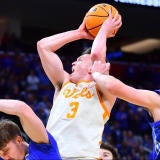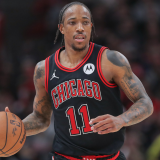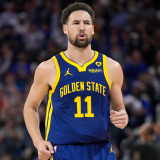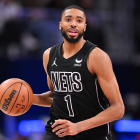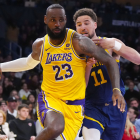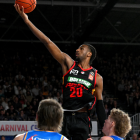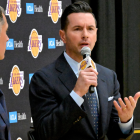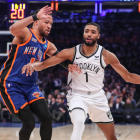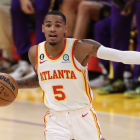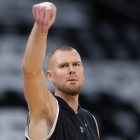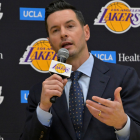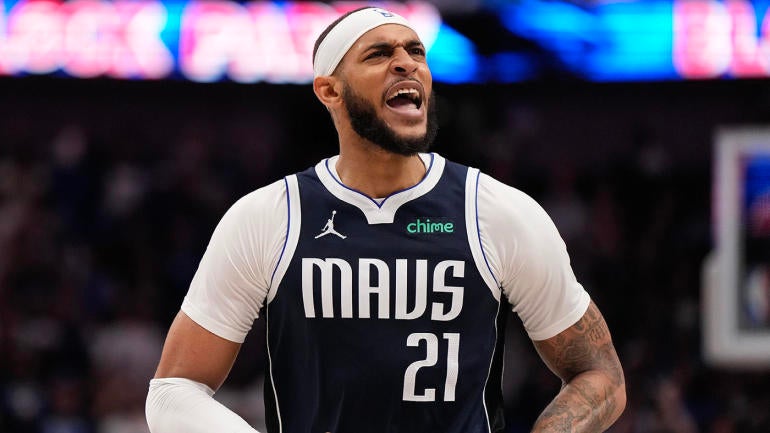
The No. 1 roster-building rule in the NBA is a simple one: you need to have a superstar. Shocking, I know. Every champion since the 2004 Detroit Pistons has had a player earn either First- or Second-Team All-NBA honors. Before the Pistons, the last team to win it all without one was the 1995 Houston Rockets, who had a former MVP in Hakeem Olajuwon. Simply put, you need a top-10 player in the NBA to win it all. The Dallas Mavericks (Luka Doncic) and Boston Celtics (Jayson Tatum) both have one.
Of course, having a top-10 player isn't exactly a replicable blueprint. It's not as though the Utah Jazz or Charlotte Hornets can just go out and sign Giannis Antetokounmpo tomorrow. But the Celtics and Mavericks aren't exactly the early 2010 Heat, either. They are not simply an assemblage of multiple superstars with few resources devoted to the rest of the roster. These are deep and thoughtfully constructed rosters with lessons that can be applied to almost any team.
So before the NBA Finals begin, let's try to figure out what we can learn from Boston and Dallas's success this season. These are the lessons other teams should learn from the Mavericks and Celtics.
Trade for players on bad teams
When the Mavericks traded for PJ Washington in February, they knew they weren't getting a finished product. When Washington arrived, he spoke openly about needing to guard a variety of different kinds of players. "I love the fact that he talked about defense because we're going to be holding him accountable," general manager Nico Harrison said at the time. Read between the lines and you get the true message: we need to hold Washington accountable because the Hornets weren't.
Young players don't always bring their best defensive effort when they have nothing to play for. The same was true of Daniel Gafford when he played for the Washington Wizards. He had a negative D-EPM last season at -0.3. When he got to Dallas, that figure jumped to +1.5 this season. In Washington and Gafford, the Mavericks identified two young players on bad teams who clearly had more to offer if they would simply be put in the right position. The moves proved transformative. Dallas ranked No. 22 in defense before the trade deadline and No. 7 after it. It went from allowing opponents to shoot 70.2% in the restricted area to 62.7% with Gafford and Washington in tow.
Derrick White was already a strong defender in San Antonio, and well-versed in Spurs culture, he'd developed an uncommon knack for doing the little things offensively as well. What he didn't do was the bigger stuff off on offense: shoot 3s, run pick-and-roll and effectively serve as a point guard. Of course, circumstances conspired against him on that front. He shared a backcourt with Dejounte Murray and DeMar DeRozan, similarly limited shooters who needed the ball quite a bit. That limited both the number of on-ball reps he'd receive and the amount of spacing he could work with. The Spurs typically rank near the bottom of the league in 3-point attempts, but in White's final full season with the Spurs, Gregg Popovich finally let him fire away. After averaging 5.1 3-point attempts per 100 possessions in his first three seasons, he leaped to 11.1 in his fourth.
The Celtics saw upside. They acquired White right as the Spurs began their pivot towards a rebuild and continued to empower him to shoot. He hit only 30.6% of his 3s in his first regular season as a Celtic, but has made roughly 39% of his attempts since. The shooting Boston surrounded him with also gave him breathing room to grow as a pick-and-roll ball-handler. The Spurs scored 0.983 points per possession on White pick-and-rolls during the 2021-22 season. That figure leaped up to 1.074 last season and 1.103 this season. Couple those improvements with the role-player skills White had already developed in San Antonio and Boston managed to snag one of the most complete point guards in the NBA for a single late first-round pick and a deep future swap.
In all three cases, Boston and Dallas identified young, cheap players who had more to offer than their original teams allowed them to display. More often than not, these kinds of players are going to be found on lottery teams. Case-in-point: both starting centers in this series were members of the 2022-23 Washington Wizards. Whether it's because of internal dysfunction, a lack of veteran mentors or a dearth of skilled supporting pieces that could allow these players to flourish, both the Celtics and Mavericks have proven what a difference circumstance can make for players like this. The Wizards and Hornets had no idea what they had in Washington and Gafford, respectively. The Spurs might've understood how good White was, but weren't in a position to maximize him. Now, all three are essential starters on Finals teams.
Opportunism is everything
When the Mavericks let Jalen Brunson walk as a free agent in 2022, it looked like they'd lost their best chance at finding Doncic a reliable offensive sidekick. They still owed a first-round pick to the Knicks, so their freedom to deal future picks was limited. They didn't have any high-end young players to dangle for another star either, and even if they could generate significant cap space, it hardly mattered because stars rarely move through free agency anymore. The going rate for a traditional, ball-handling star on the trade market has hovered around four or five first-round picks, a handful of swaps and a meaningful young player or two. Dallas had no way of meeting that price.
Fortunately, a rather untraditional star hit the market at the 2023 deadline. Kyrie Irving is, obviously, a risky addition. He spent only two years in Boston before ditching the Celtics in free agency (despite publicly vowing to stay). Then, his off-court behavior blew up a once-promising situation in Brooklyn that he hand picked. Only a few teams actively pursued Irving when he became available. The Lakers balked at the idea of including Austin Reaves with the two first-round picks they could offer. The Suns toyed with a pursuit of Irving, but opted to keep their powder dry to pursue his teammate, Kevin Durant, a few days later. The Clippers lacked the draft capital to make a meaningful offer.
That put the Mavericks in a simultaneously enviable and hazardous position. They had a chance to trade for Irving, an All-NBA talent, in exchange for one first-round pick and two veteran role players. If Irving behaved in Dallas as he had in Brooklyn and Boston, it would have blown up the team. The Mavericks would have had no assets remaining to reload around Doncic, and he very well could have asked for a trade in the near future. Instead, Irving was a model citizen, and the Mavericks acquired a talent they would have had no way of accessing under normal circumstances.
The Celtics didn't exactly take a risk when they landed Jrue Holiday. Unlike Irving, Holiday is perhaps the least controversial player in the entire NBA. He is the only player ever to win multiple Twyman-Stokes Teammate of the Year awards, and he's won it three times. His skill set fits onto any roster. He can defend almost any player, make 3s, function as a secondary shot-creator and score easy points through bully-ball tactics against smaller mismatches.
But the Celtics didn't land Holiday at the trade deadline or in July. They got him in September when he was unexpectedly included in Milwaukee's blockbuster deal for Damian Lillard. Teams rarely make deals of that magnitude right before training camp. Doing so forces them to completely scrap their ideas of what kind of team they planned to be.
But you don't control what opportunities will cross your doorstep, and more importantly, you don't control when they will arise. Building a championship team often means being nimble, being willing to change your plans on the fly and taking risks that other teams wouldn't. Sometimes those risks can blow up in your face, but championship teams aren't built by accident. The Mavericks and Celtics seized opportunities that other teams passed on, and that's part of why they're in the Finals right now.
Be willing to make the hard choices
For years, Marcus Smart was described as the "heart and soul" of the Celtics. Tatum and Jaylen Brown may have been the driving forces behind their on-court success, but Smart was seemingly the voice of the locker room. Such a player would theoretically hold outsized importance on a team that had just gone through three coaches in three seasons. But when a version of the Kristaps Porzingis trade with Malcolm Brogdon fell apart at the last minute because of a medical issue, Boston didn't hesitate to replace him in the deal with Smart.
That decision served several important functions. Memphis, simply put, was willing to give up far more for Smart than the Clippers were for Brogdon. That armed the Celtics with two extra first-round picks in addition to Porzingis. One of those picks wound up being the most significant asset Boston sent to Portland in the Holiday trade.
But intangibly, Smart's removal forced Tatum and Brown to take on a greater leadership role in Boston's locker room. When the team needed to figure out who among their six core players would start and who would come off of the bench, it was Tatum who ultimately called the meeting with Brown, Holiday, Porzingis, White and Al Horford that settled it. Smart is still well-regarded as a leader around the league, and the Grizzlies are happy to have him. But sometimes, when a team experiences several playoff disappointments, it needs a new heart and soul in its locker room. The Celtics are flourishing in part because Tatum and Brown have stepped into Smart's shoes.
Meanwhile, the Mavericks were accused of lacking any heart and soul at the end of the 2022-23 season. The early results of their Irving gambit had proven disastrous. The Mavericks had risen as high as No. 4 in the Western Conference in January of 2023, but their defense collapsed after the Irving trade, and it had become clear by April that they would face an uphill climb just to sneak into the postseason. Doing so would have almost certainly meant sending the Knicks their top-10 protected first-round pick, which likely would have come in at No. 11.
So Dallas went the other way. Before the Mavericks were mathematically eliminated from playoff contention, they elected to tank the final few games of the season in order to protect their pick. They were roundly ridiculed for their decision. Even Doncic wasn't happy about it. But the Mavericks saw the bigger picture. They knew that they were unlikely to make any noise in the playoffs as a No. 10 seed, but a top-10 pick could be an extraordinarily valuable asset as they attempted to rework the roster in the offseason. They were right. That pick wound up getting them Dereck Lively II, perhaps the third-best player on the team and one of the most promising rookie centers to enter the league in years.
In Lively, the Mavericks not only added a pillar of this year's contender, but found the ideal big man to pair with Doncic for the long haul. It's not an exaggeration to say that Lively's presence as an elite rim-protector and pick-and-roll finisher with some ball skills has changed the entire trajectory of the Doncic era in Dallas. If nothing else, Doncic now knows that he'll have one, core teammate for the rest of his prime. If Lively is as good as rookie year suggests he can be, he might even replace Irving as the second Dallas All-Star in the next few years.
These are the kinds of hard decisions that general managers are paid to make. Playing it safe can get you into the playoffs. It might even win you a round or two. But the willingness to do what other teams won't is what defines a champion.
There is strength in numbers
Both the Celtics and Mavericks dealt with meaningful injuries this postseason. Doncic played through ankle and knee issues that were especially apparent in the second round against Oklahoma City. Boston barely had Porzingis at all in the first three rounds. In the older super team model that dominated the 2010s, the Mavericks and Celtics might've been out of luck. When your team's salary is devoted entirely to a small number of players, you lose any ability to adjust to injuries or poor matchups.
The Celtics were fine without Porzingis, sliding Horford into the starting center position and gliding through a 12-2 Eastern Conference run. The Mavericks beat the Thunder despite Doncic averaging "only" 24.7 points per game in the series because all of the attention he drew, even hobbled, created a ton of wide-open 3s for Derrick Jones Jr. and Washington, who made more of them than their regular-season numbers suggested they should have. Depth, in both cases, saved the two finalists. The Celtics and Mavericks both had players capable of stepping into bigger roles when circumstances demanded it.
Now, think of the teams that came into this postseason with three max players on their books. Both the Suns and Clippers bowed out in the first round. The Clippers had no way of adjusting when Kawhi Leonard got hurt. The Suns had no depth to supplement Kevin Durant, Bradley Beal and Devin Booker.
As the harshest new rules from the 2023 CBA kick in this offseason, this reality is only going to get starker. It will become nearly impossible to pay three players max money, especially if those players are all only the 35% super max as most older stars will be. The Celtics and Mavericks have found what will likely become the most popular middle ground moving forward: two superstars along with a cadre of eight-figure supporting pieces and rookie scale players comprising the rest of the roster. Boston relies most heavily on six players. The Mavericks have given meaningful minutes to 11 players this postseason and will emphasize the ones that make the most sense in a given matchup.
There isn't an exact right answer here. To be blunt, Boston's six are better than any six that Dallas has. If you have the right six, that's the answer. If not? Having the versatility that Dallas does to play the matchup game is a tremendous advantage in its own right. All we can say safely at this point is that depth is becoming more important in the second-apron world than it has been in the past. Three players aren't enough anymore.



